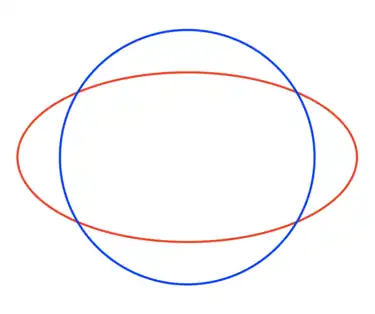
An elliptical dome, or an oval dome, is a dome whose bottom cross-section takes the form of an ellipse.[1] Technically, an ellipsoidal dome has a circular cross-section, so is not quite the same.
While the cupola can take different geometries, when the ceiling's cross-section takes the form of an ellipse, and due to the reflecting properties of an ellipse, any two persons standing at a focus of the floor's ellipse can have one whisper, and the other hears; this is a whispering gallery.
The largest elliptical dome in the world is at the Sanctuary of Vicoforte in Vicoforte, Italy.[2][3][4]
In architecture

Elliptical domes have many applications in architecture; and are useful in covering rectangular spaces. The oblate, or horizontal elliptical dome is useful when there is a need to limit height of the space that would result from a spherical dome. As the mathematical description of an elliptical dome is more complex than that of spherical dome, design care is needed.[5]
In a geodesic dome with a circular base, the triangular elements align so their edges form great circles. Although not geodesic, a new, elliptical design was patented in 1989; it uses hexagons and pentagons to form a dome with a cross section that is elliptical. Due to its mathematical derivation, this design is called "geotangent".[6]
World examples
Elliptical domes come up in the design of all of the following:
- A number of mosques in Cairo, Egypt,[5]
- Part of St. Peter's Basilica, in Rome, Italy[7]
- The Basilica of St. Lawrence, Asheville, in Asheville, North Carolina,
- The Church of Saint Roch, Žižkov, in Prague, Czech Republic,
- The Four Domes Pavilion, in Wroclaw, Poland,
- The Indiana Theatre, in Indiana, city of Indianapolis,
- The Joe and Rika Mansueto Library, at the University of Chicago,
- The Kanteerava Indoor Stadium, in Bangalore, India,[8]
- The Mayflower Hotel, in Washington, DC,
- The Mosque–Cathedral of Córdoba, in Andalusia,
- The Palau Nacional, in Barcelona, Spain,
- The Pisa Cathedral, in Pisa, Italy,
- The Rose Hill Mansion, Bluffton, in Bluffton, South Carolina,
- The San Filippo Neri, in Turin, region of Piedmont, Italy,
- The Sant'Andrea in Via Flaminia, in Rome, Italy,
- The Santa Caterina, Casale Monferrato, in Casale Monferrato, Province of Alessandria, region of Piedmont, Italy,
- The Seville Cathedral, Spain,
- The Skyspace Lech, Tannegg/Oberlech in Vorarlberg, the westernmost federal state of Austria,
- The State Savings Bank Building, in City of Sydney, Australia,
- The Temple Sinai, in Oakland, California,
- The Sanctuary of Vicoforte, in Italy.
See also
References
- ↑ Arun, G (2006). "Behaviour of Masonry Vaults and Domes: Geometrical Considerations" (PDF). Structural Analysis of Historical Constructions, New Delhi.
- ↑ "Visiting the largest elliptical dome in the world, in Vicoforte". ItalyRiveirAlps. 25 April 2016. Retrieved 2020-12-04.
- ↑ Chiorino, Mario Alberto (2008). "Modeling Strategies for the World's Largest Elliptical Dome at Vicoforte". International Journal of Architectural Heritage. 2 (3): 274–303. doi:10.1080/15583050802063618. S2CID 109078429.
- ↑ Aoki, Takayoshi. "Structural characteristics of the elliptical masonrydome of the sanctuary of Vicoforte".
- 1 2 Elkhateeb, Ahmed Ali (2012). "Domes in the Islamic Architecture of Cairo City: A Mathematical Approach" (PDF). Nexus Network Journal. 14: 151–176. doi:10.1007/s00004-011-0103-3. S2CID 119996869.
- ↑ "Polyhedral structures that approximate an ellipsoid".
- ↑ "The Engineering Behind Saint Peter's Basilica".
- ↑ Kobielak, Sylwester (November 27, 2016). "Oval concrete domes".
